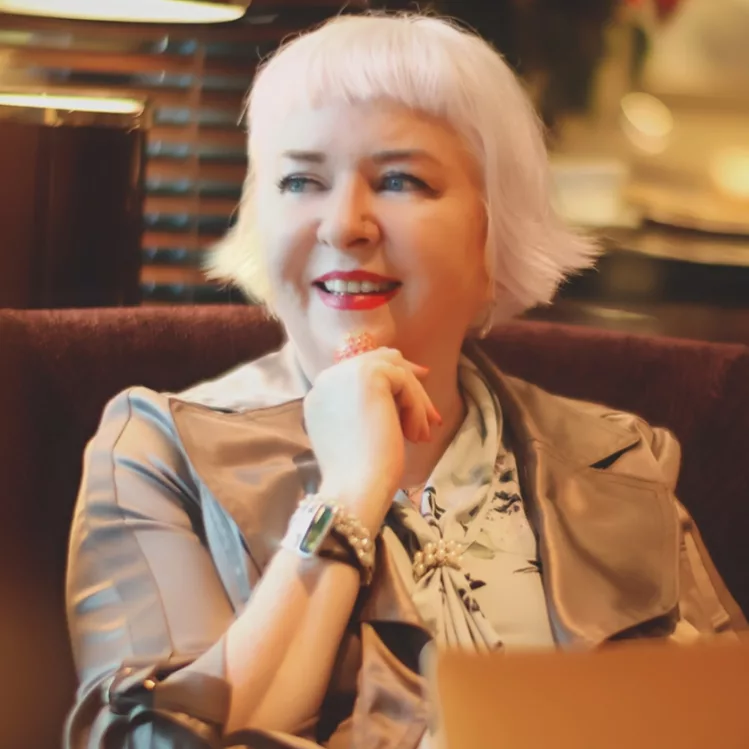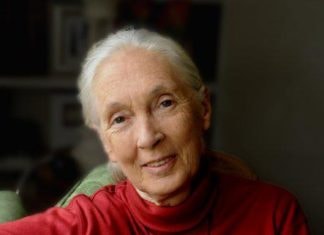
Jane Goodall: I want to ensure future generations that will respect all life
Jane Goodall
My great reason for hope is the indomitable human spirit
By Trevor Clarke
Dame Jane Goodall is a woman who has devoted virtually her whole adult life to the study of chimpanzees and conservation to protect the environment and animal habitat, especially in Africa, a continent she first visited at the age of 26. Her interest in nature has been with her from a very young age, starting with hens on a farmyard and Jane tells us how much her mother has been an influence and role throughout her life. Bestowed with many awards, Jane is the guest of honour for the Jane Goodall Intitute at the Inspirational Awards for Women in London on 8th September. Jane also talks about her work, beliefs, the role and mission of the two organisations she founded, the challenges she sees that the world is facing and what needs to change, along with her hopes for the future of humankind and the planet.
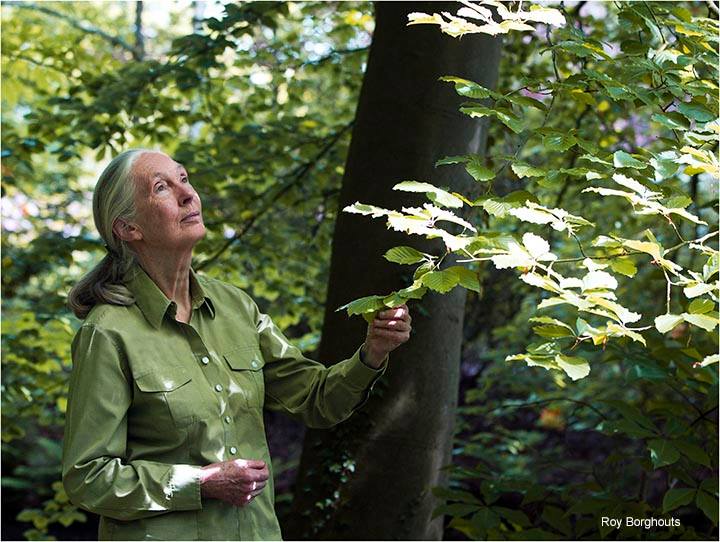
What were the influences from your childood and your parents which led you on the journey and mission that you undertook?
I was five years old when World War 2 broke out and I went with my mother and little sister to live with my maternal grandmother, Danny (I could got say GRanny). We lived in a Victorian red brick house in Bournemouth, with a big garden. My father had joined up – I never really knew him, even before the war. We had very little money and there was rationing of food, clothes – everything. We grew vegetables among flowers in the garden.
From the tiniest child I had loved animals of all sort. My mother supported this. When we went for a holiday onto a farm (before the war) I hide in a her house for four hours, waiting for a hen to come in from the farmyard to lay an egg. I was given the job of collecting eggs, and no one would tell me where the hole was, or where the egg came out of the hen. My mother, who had been frantic with worry, nevertheless saw my excitement and sat down to hear the wonderful story of how a hen lays an egg. Otherwise my enthusiasm might have been dampened, and I might not have done what I went on to do.
Dream about something you can achieve I was told…
I spent hours in Bournemouth roaming the cliffs above the sea with my dog, Rusty, watching birds, insects, and nature. I went to riding stables at weekends, with no money to pay for riding lessons but helped out with the horses, cleaning tack and on the farm, and I got free rides. At the age of ten l I fell in love with Tarzan (from reading books, no TV back then) and determined to go to Africa, live with wild animals and write books about them. I always loved writing. Everyone laughed at me, Africa was a dark continent far away and we had no money, and, I was just a girl! Dream about something you can achieve I was told. But my mother told me simply that I would have to work very hard, take advantage of opportunities and never give up. I take her message around the world today, and the reward is people who thank me – ”You taught me that because you could do it, I can do it too”.
How have your views evolved or even changed since your childhood and younger adult years?
Well, the world has changed so much. I know what we are doing to the planet. I know the need for conservation. And that this will never work without the buy-in of local people. I did not think of such things, or needed to when I was young.
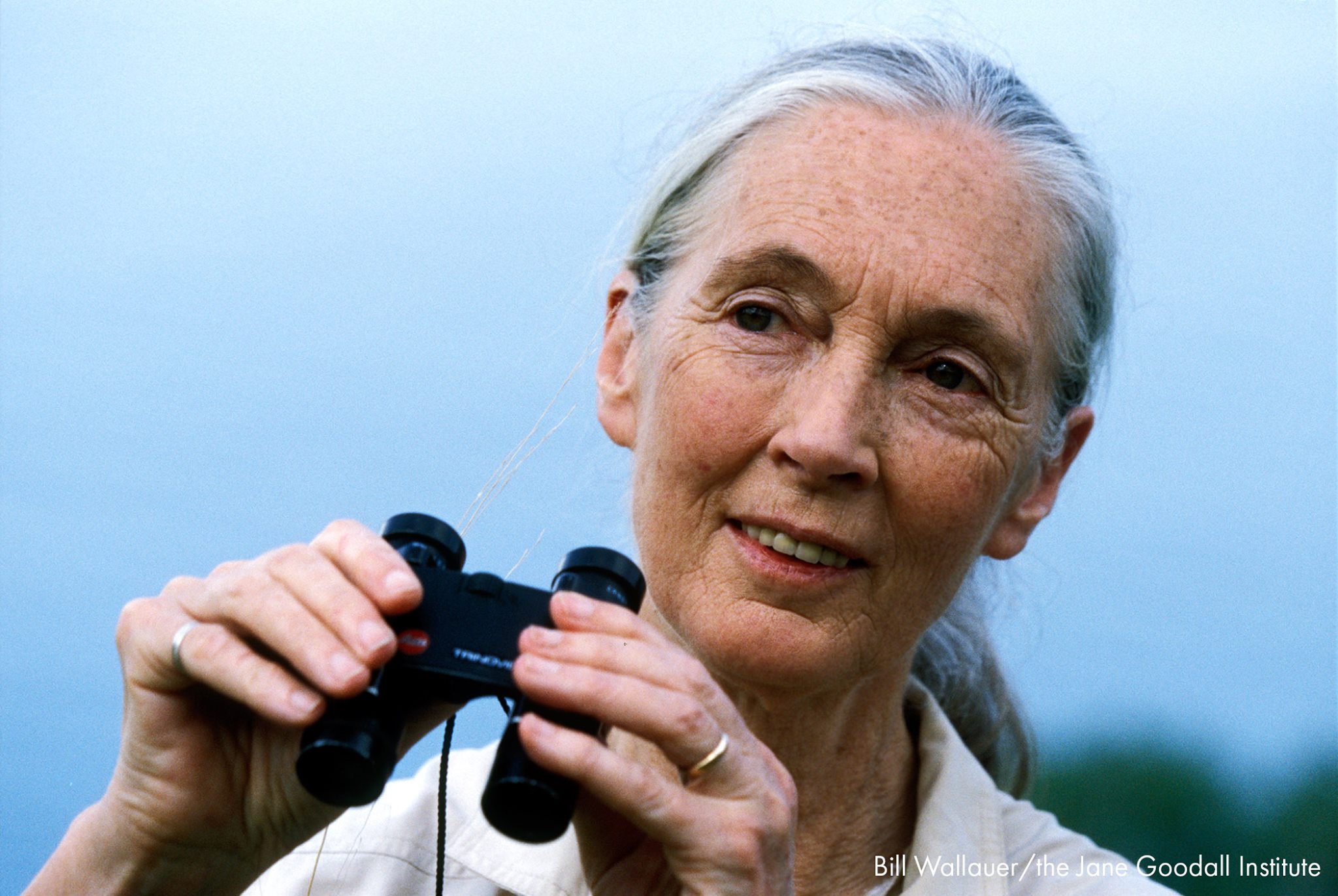
What are your earlier memories of your time in Africa and how these experiences led you to so many great discoveries and achievements of world renown?
I first went to Africa in 1957 when I was 23, after being invited to Kenya by a school friend. I had not been to college, had no money and was working in London. I quit my job and worked as a waitress in a hotel around the corner until I had saved up enough money for the return fare. In those days one travelled by boat and I went on the ’Kenya Castle’. I heard about Dr Louis Leakey, a Paelaeontologist, went to see him and got a job at the natural history museum. I was invited to go on a ”dig” for three months in the summer to Olduvai Gorge, searching for the stone age ancestor that the Leakey’s were SURE were to be found (they were right). During this safari Dr Leakey asked if I would go to study chimps in Tanzania. It took a year to get the money and permission to do that. I then set off in 1960 aged 26. I first set foot on African soil in Cape Town. I was excited – but utterly shocked by the signs of apartheid that were everywhere. I was happy when the ship sailed away from there. Kenya was just pre independence, though it still had much racism. When I arrived in Tanzania I got to visit Ngorongoro Crater and Serengeti, where all the animals were. It was Tanganyika then, but still part of the crumbling British empire. I had to leave Gombe when independence was declared in 1961 lest there would be rioting – there was not and I could return.
Your second husband was a member of the Tanzanian government, who helped your research project that protected Gombe. Tragically he died young in 1980 from cancer. Can you tell us more about his influence, and what gave you the strength to continue?
Derek had been shot down in the war – he was flying fighter planes, and he walked with a stick. I was very inspired by his courage and determination. He was close to Tanzania’s first president, Nyerere, and I met him. He loved Gombe, and as Director of National Parks was able to help get research permits for my students. After his death I felt that part of my world had ended. I sought healing in the forests of Gombe, by myself. I carried on because I do not easily give up. There have been many set backs, and I have overcome them all. A major factor in all this was the support of my mother. She was there for me on every occasion.
Your research has resulted in two long standing beliefs, one is that not only humans can construct tools and the other that chimpanzees are not vegetarians. In your time of research and studying, what were your greatest challenges and how did you overcome them?
The most significant discoveries were the using and making of tools and, less importantly that chimpanzees are not just vegetarians but hunt and eat small to medium sized mammals. Meat is not a major part of their diet, it is mainly fruit and other vegetable matter. When Dr Leakey made me go to Cambridge for a phd the professors told me I had done the study wrong. Many of them felt that the chimps should have been given numbers, not names. And I was told that I could not talk about chimpanzees having a personality, a mind capable of thinking, and emotions. Those I was told were unique to humans. There was a difference between us and other animals of KIND. Fortunately my childhood teacher, and my dog Rusty, had taught me otherwise. The chimpanzees are so like us in behaviour and biology. They share a 98% structure of DNA with us, and show a marked similarity of composition of blood, immune system and anatomy of brain, that they helped science understand that we are part of a kind, not separated from the rest of the animal kingdom
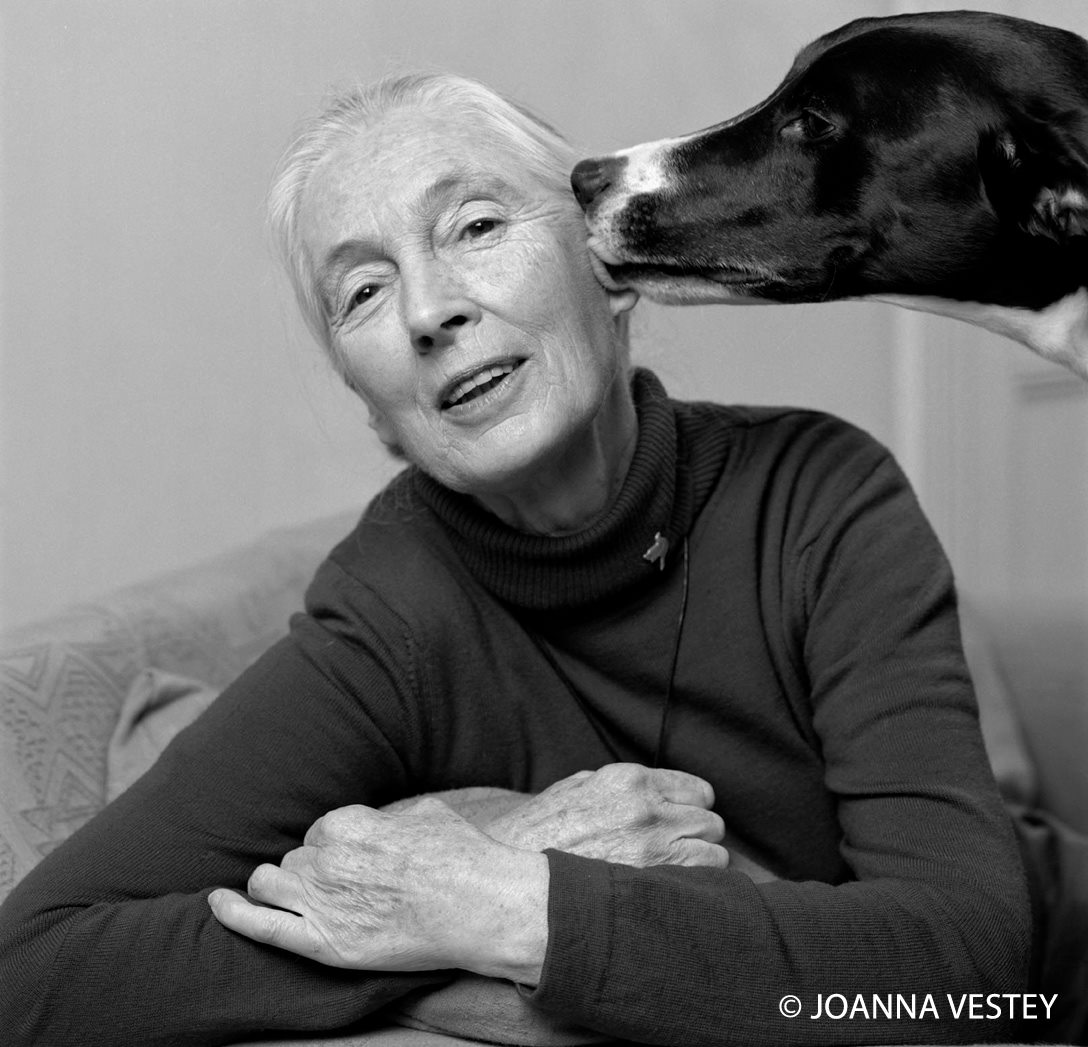
You have devoted most of your life to activism. Can you tell us more about why you decided to create organisations such as the Jane Goodall Insitutue and Roots & Shoots among others, and what you want them to achieve, presently and in the future?
In 1986 I went to a conference in Chicago where we brought together for the first time all those studying chimps – by then in six other study sites. We had one session on conservation and it was shocking to see that in all places chimpanzee numbers were dropping. Forests were being cleared out by foreign logging and mining companies, or for agriculture, and African populations were expanding into the forests, often with cattle. Not only chimpanzees but other animals were being decimated. And when I travelled in Africa to learn more about this, I realised the plight also of so many African people living in and around chimpanzee habitat. I recognised that unless we improved the lives of the people, sought them as partners in conservation, and involved them in the work, we could not even try to conserve the chimpanzees. The JGI-USA (Jane Goodall Institute) started our TACARE programme, improving the lives of the people, initially around the tiny Gombe National Park, then expanding southward to where most of Tanzania’s remaining chimps live outside any protected areas, in village forest reserves. We now work in 52 villagers and improve their lives in a very holistic way (improved farming methods, better education and health facilities) micro credit programmes expecially for women, scholarships to keep girls in school after puberty and family planning information. As the villagers came to trust us (we always asked them what we could do to help, rather than sweep in with white people’s ideas) we were able to train volunteer forest monitors to use smart phones, record the health of their forests, upload the data onto a platorm in the cloud, Global Forest Watch. We now have similar programmes in Uganda, Burundi, Democratic Republic of Congo, and with JGI Spain, in Senagal and Guinea. We hope to move into other chimpanzee range countries.
All of this means a lot of hard work, which is not much use if new generations are not raised to be better stewards than we have been. For we are destroying the planet by our unsustainable lifestyles on the one hand, crippling poverty on the other, and destroying the environment in a desperate effort to grow more food. In urban areas they are buying the cheapest stuff and not thinking about how it is made, if it has harmed the environment, involved cruelty to animals, used child slave labour, and so on.
I began our youth movement, Roots & Shoots, because I found young people, on every continent, who had not much hope for the future. ”You have compromised our future and there is nothing we can do about it”, they told me. Indeed we have but I think we have a window of time when, if we all work together, we can start to turn things around. R&S began with 12 high school students in Tanzania and is now in 100 countries, with members from pre-school through to university, some 100,000 active groups in all. Our main message is that each one of us has a role to play and makes a difference EVERY DAY. Groups discuss the problems in their area and choose projects that will tackle those problems – one to improve things for people, one for animals, and one for the environment. They roll up their sleeves and go to work.
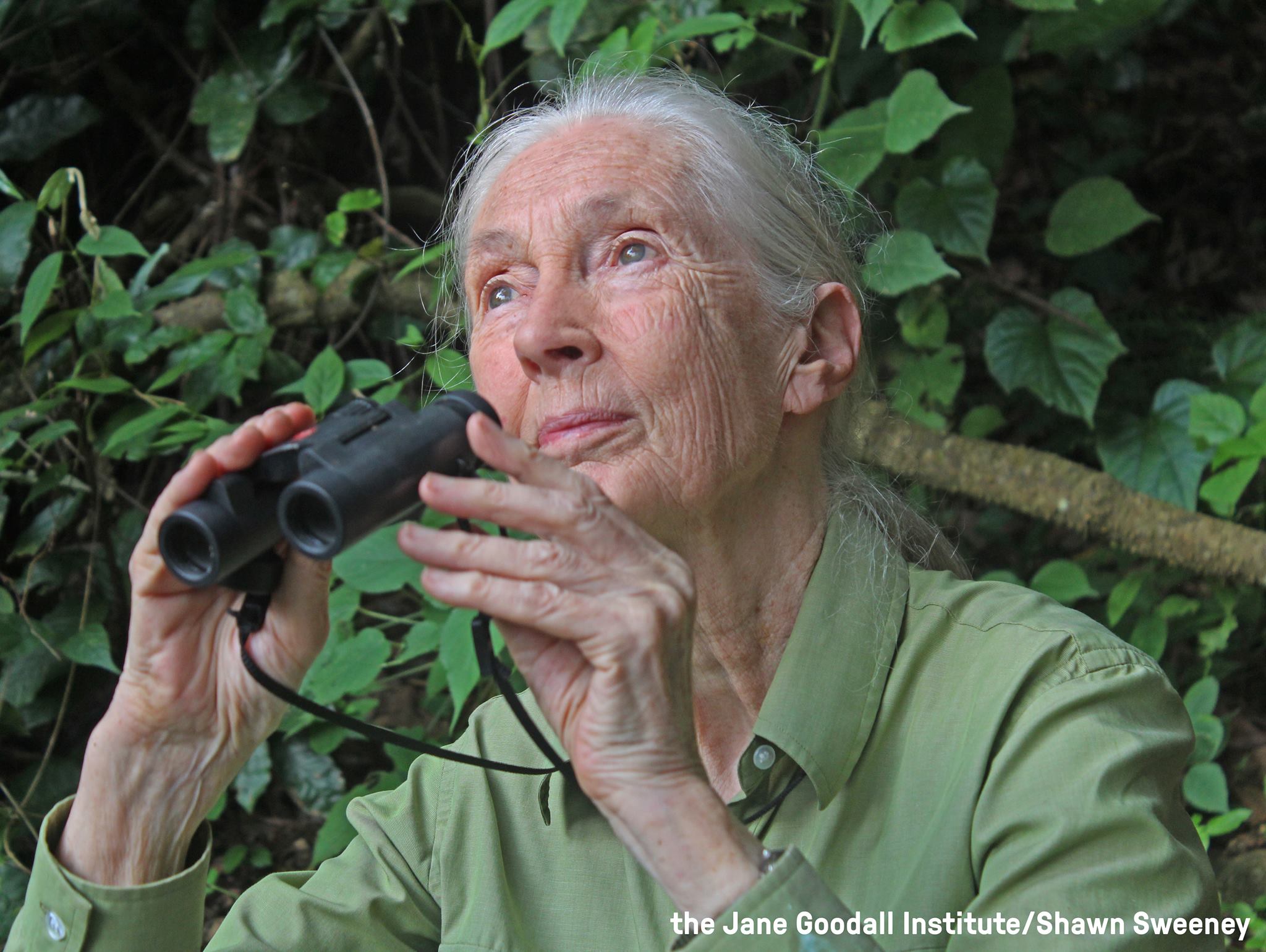
You have numerious awards and medals for your work throughout your life. Which awards mean the most to you and why?
The CBE made my mother so proud – and my father joined us at Buckingham Palace to receive it. She would have been even more thrilled by the DBE. Many awards are not only a great honour, but are very helpful in raising the profile of the JGIs in different countries (there are JGIs in 33 countries now), as are the French Legion d’Honeur, several of those which I have received in America. And some honorary degrees have been very special, such as in Tanzania,
As an inspiration and a role model to so many in the world, who has inspired and influenced you the most throughout your life?
Initially my mother. Dr Louis Leakey. Nelson Mandela and Muhatma Ghandi. Mohammed Yunis who started the Grameen Bank. And all those people who tackle seemingly impossible tasks and won’t give up. They are all around us. There are some amazing people in all countries in all walks of life, overcoming physical disabilites and personal disaster. All are illustrating my great reason for hope – the indomitable human spirit.
You said in 2010 that believe in a strong spiritual power that is connected with nature. Can you enlighten us more about this belief and how it impacts you in your daily life?
I believe in a Great Spiritual Power that is easily found (for me) in nature, but also in certain buildings like ancient cathedrals, temples, mosques. It gives me strength to carry on when I am exhausted.
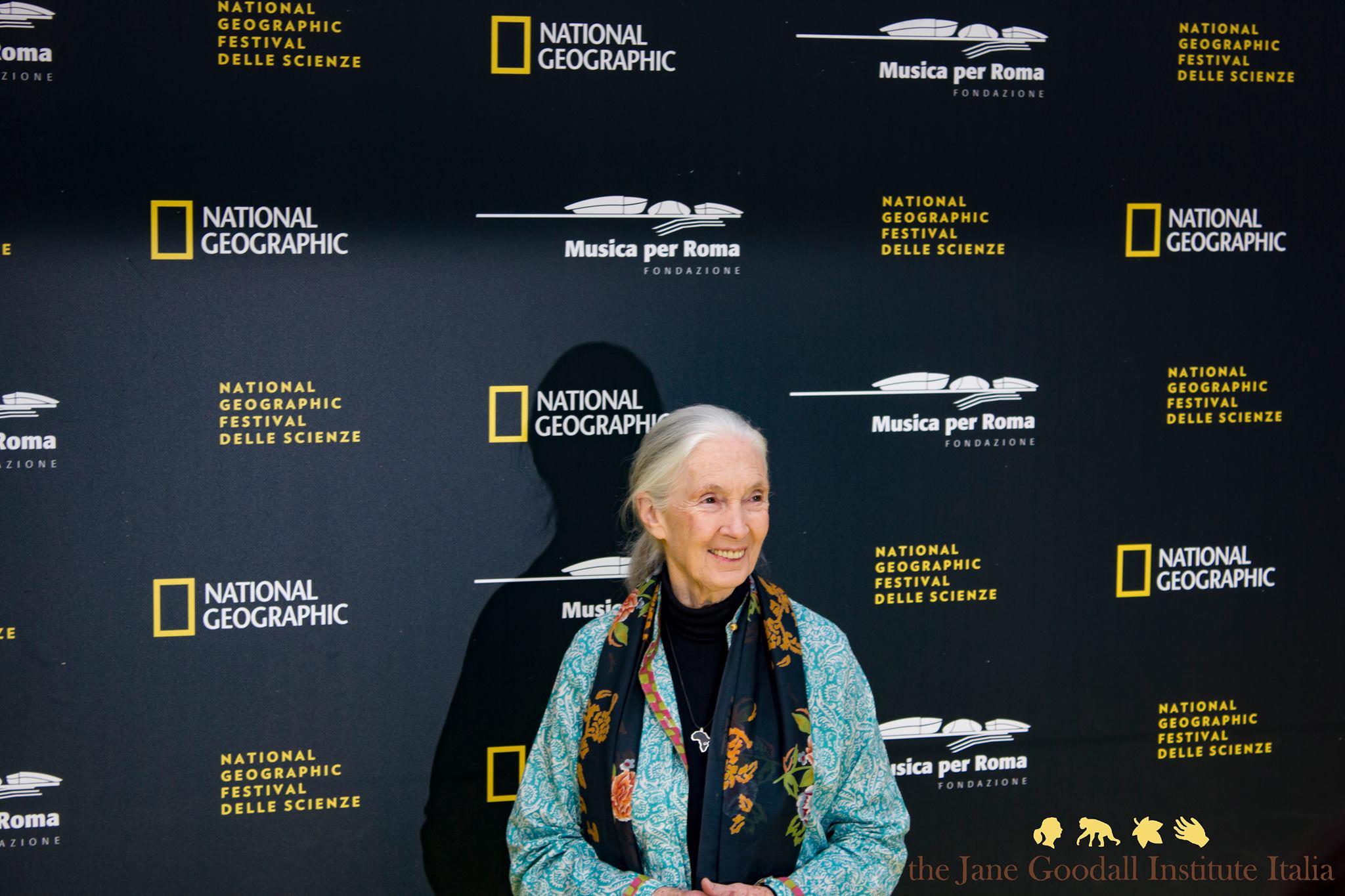
You are famous and recognised in many countries of the world but strangely, not so much in your native country, the UK. Why do you think that is and would you wish that to change?
I am always hoping for greater recognition in the UK beause this will help JGI-UK to raise funds to carry out our programmes – Roots & Shoots (now in 1,600 schools thanks to our two wonderful people on staff, Mary Lewis, Tara Golshan and Jasmina Marcheva) and our support for our Africa programmes, including the Gombe Research and our sanctuaries for orphaned chimpanzees in Congo (Tchimpounga) and South Africa (Chimp Eden).
What else is left for you to achieve and what would you like your biggest legacy to be?
I want to continue spreading Roots & Shoots in more and more schools around the world. I want to ensure future generations that will respect all life – and we encourage R&S to respect animals and nature, but also people of different nations, cultures and religions. I would like my biggest legacy to be twofold – giving hope to people so they will take action to save the planet before it is too late – especially through R&S. And helping people to respect animals, understand that they too have lives that matter, are sentient, and feel similar emotions to ourselves, especially contentment, fear, despair and pain.




